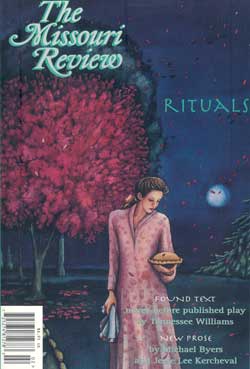Poetry | September 01, 1997
The Memory Palace
Colin Hamilton
for there is no place that does not see you.
—Rilke
THE DOORKNOB
extends a hand in greeting.
Like your hand, it’s scarred.
When you shake it, you know:
someone with small teeth
has been trying to get out.
THE DOG
beats time against the wall:
thump-thump-thump-thump.
She needs you to see past
her wet, dark gums, past her tongue
to the place where these hot,
scented storms are brewing.
Your eyes aren’t windows after all.
No matter how close she pants,
they don’t steam up.
THE JAR
filled with seashells sits in a corner.
Sand dusts the inside of the jar,
but who can say whether sand is becoming glass
or glass becoming sand? Past
the sand are shells, each perfect and
the same: polished, slit cylinders speckled
black and brown. When you uncork the jar,
the sound of waves doesn’t drown the house,
but fireflies dim beside your bed.
THE LIGHT
doesn’t shatter the window,
but takes its form, tunneling through
the room to cut a brilliant patch
of carpet. Ten billion particles
of dust, of skin
inhabit the light, yet this far end
of the sun, cast before
your feet, burns unspeckled.
THE SADDLEBAG
is too rough for this couch.
Woolen strands arch out from
its stitch and finger through
your shirt. You’d need
a camel’s back, a mule’s indifference,
to lie against this bag in
peace. You’d have to fill it instead
with rice or wheat, then open
this room into a mountainy
desert. The only water
would be the small well inside you.
THE KITCHEN TABLE
A circle divided in half, like a flat
world with a single river.
This is winter: the river is frozen,
the wood is covered in ice
and there is nothing to eat.
Dust has collected inside the sun,
which hangs from the sky by a cord.
A long time ago, the moon rolled
off the far edge of the world.
THE CLOCK
This much you can bear: each thing
has its duration. Each second
strikes at the sky. Each hour
unwinds the last. What’s harder
is to know that at six-fifteen
your teeth will loosen. If it is ever
ten o’clock, your family won’t come home.
At midnight, the darkness will speak.
THE MASK
Because nostrils can only flare
so wide, small worms
have bored gaping pores
across his cheeks and nose. They take
everything in. His brow
furrows, funneling whatever approaches
into his eyes. What does he see
which reddens his face? He can’t
say, for his jaw’s been broken.
It drops straight down,
drawing its tongue to hang, to lap,
to thicken with dust.
THE BOOKSHELVES
line three of the room’s five walls;
the others are doors. This is the quietest room,
for the shelves with their books
form another layer of wall and the doors are shut.
This is where you wait. Dante waits too,
inside a glass case. Legs straight, his arms in line
with those of the chair, he could wait forever.
Inside the shelves, books are packed
densely together, their mouths clamped shut.
THE CLOSET DOOR
shuts, and color escapes
from the jackets and shirts which hang
along the rack. Like people
who’ve lost the thing that lets them see,
they stand very still and listen.
When they hear you move,
their awkward arms grope over you,
cotton and wool. Ignore them.
Inside the closet is another closet:
that’s the darkest chapel there is.
THE SISTER
speaks to the cat in French.
The cat, drugged with sun, her face like a flower,
listens. If you had slept in the sun,
if your face were a flower, would you
understand? If your eyes
were that large, hair that black, skin so dark,
would you say the same things?
THE BATHTUB
is too white: only a pearl diver would believe it,
or the oyster herself. And smooth,
as though that rough pearl had been passed
from nervous child to nervous child to nurse.
In a perfect world, where rivers are milk,
all canyons would deepen like this.
But the world isn’t perfect, so the bathtub remains
an animal: one tusk crusted by lime,
a grated nostril, a chained rubber tongue.
THE ATTIC
must be opened. In this sealed box,
a bulb reveals how fabric, books, animals and chairs
decay to dust, how dust evolves to air.
You don’t want to breathe it. There’s too much inside
you
already. The slanted ceiling is ribbed
with wooden boards. The wooden boards are studded
with black nails. Around each nail, wood splinters
the way light does around each star—no
cracked dome of heaven, but one that’s been hammered
down.
If you are a student, faculty member, or staff member at an institution whose library subscribes to Project Muse, you can read this piece and the full archives of the Missouri Review for free. Check this list to see if your library is a Project Muse subscriber.
Want to read more?
Subscribe TodaySEE THE ISSUE
SUGGESTED CONTENT

Editor's Prize Winner
Apr 16 2024
6 Poems by Lance Larsen
The Poet Translates the Cryptic Text He Sent in a Fever from the Camino de Santiago Trail When I said the longest day of the year, I meant not solstice… read more

Poetry
Apr 16 2024
from “My Heart and the Nonsense,” a poem by John Okrent
from “My Heart and the Nonsense” “Oh heavens, all the lives one wants or has to lead.” —Robert Lowell, in a letter to Elizabeth Bishop I. Before I longed to… read more

Poetry
Apr 16 2024
6 Poems by Fleda Brown
Walk, I After a mile or so arthritis begins to tighten my back and I start trudging, walking to keep on walking, which is what you have to do.… read more

